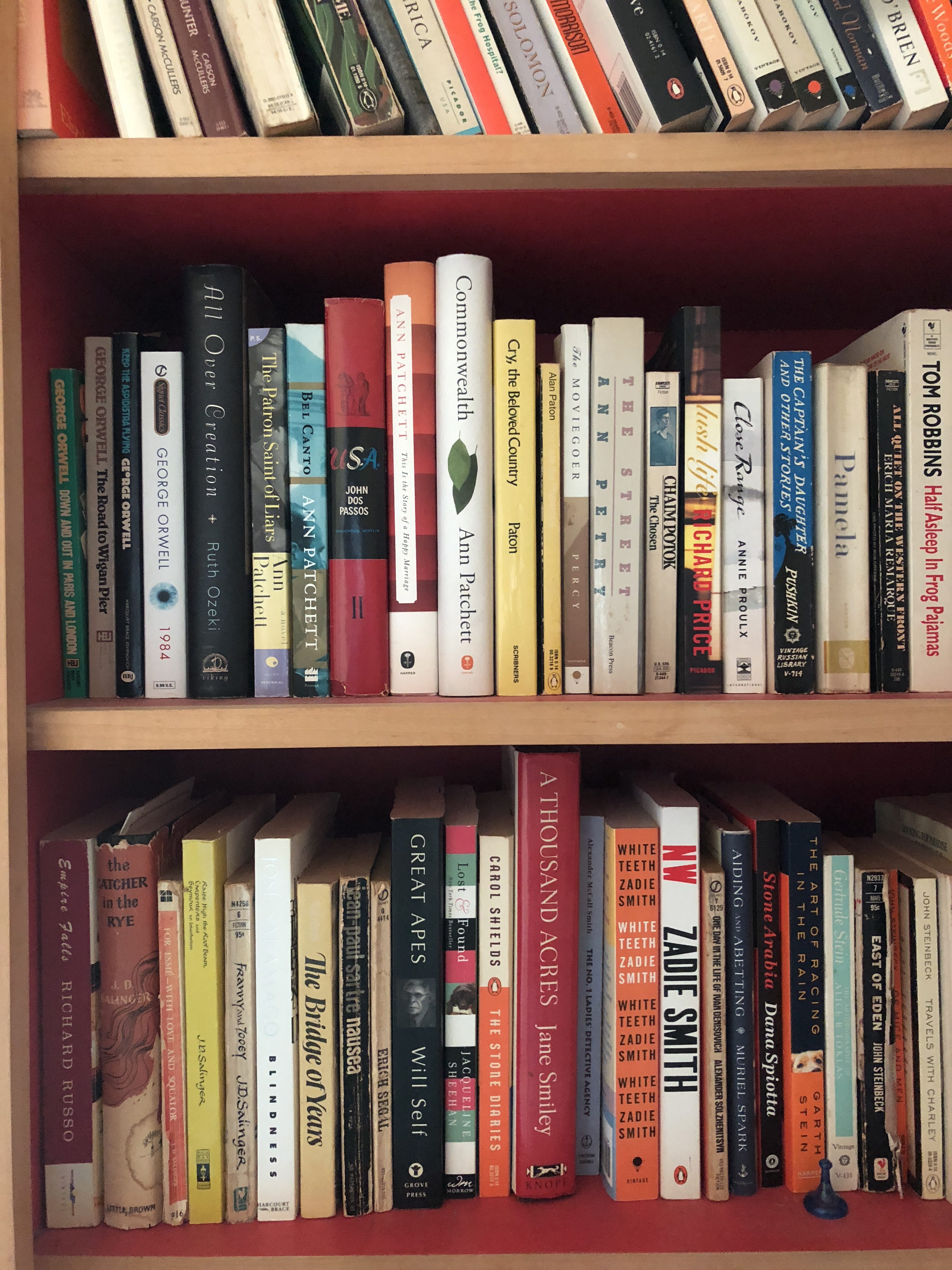Day 31: Just Write
With the first crocus, all possibilities open up. Finally the ground is beginning to shift. The siding is going up. There are chimneys in the roof for the two…

A designer friend of mine shook his head when I suggested a choice for our kitchen renovation. “No,” he said, “I don’t think that will succeed.” It was the first time I had ever thought of a kitchen’s success or failure. What did he mean by this? Well, I knew, actually. He meant the choices––for there are always choices–– had to work both artistically and structurally. The same, I am coming to understand , is true for fiction. What makes a novel succeed? And I don’t mean commercially. Can we agree on this? Probably not, just as we can’t agree on our list of favorite books or albums. So I am curious: What novels have you loved that you see as both an artistic and structural success? Or, to put it another way, what novels have a satisfying integrity to them?
For me, here are some musts:
And although I do need to feel some completion at the end, I keep off my list of musts “A brilliant ending.” I say this because in our last Fiction Writing class yesterday, we read a craft essay about Endings, and the author was critical of many of the typical forms endings take. For example, the happy ending where everything gets tied up, the moralistic ending, the open-ended ending, the Big Bang ending, the epilogue. Endings are hard, we were instructed. They need to sum up all the themes, lead the reader to say, (to paraphrase Faulkner) “I didn’t see that coming, but OF COURSE! That’s the only possibility.” The ending needs to give the reader hope for the future. It needs to change the reader’s outlook on life. It needs to make the reader cry. Etc.
I am not convinced. I just paid a visit to the Fiction section of our not-yet-completely-KonMaried-library, and looked back at all my favorite reads. Here is an incomplete list of books I have loved that do not have (to my mind) satisfying endings, or with whose endings I took issue:
Their Eyes Were Watching God, Zora Neale Hurston(though I LOVED the last two paragraphs! But the novel’s last scene seemed very rushed, very “told”)
Underground Railroad, Colson Whitehead
Americanah, Chimamanda Ngozi Adichie
The Neapolitan Novels by Elena Ferrate
All the Light We Cannot See, Anthony Doehrr
Brooklyn, Colm Toibin
The Interestings, Meg Wolizer
Homegoing, Yaa Gyasi
NW, Zadie Smith
And yet I still loved them, still felt glad I spent time with them.
And here is a list of books whose endings I loved, whose endings transported me. After I finished each of these books I had to just sit for a few long minutes staring into space. And then I had to go back to page one and re-read the beginning.
The Great Gatsby, F. Scott Fitzgerald
The Optimistic Decade, Heather Abel
Middlesex, Jeffrey Eugenides
White Teeth, Zadie Smith
Salvage the Bones, Jesmyn Ward
Let the Great World Spin, Colum McCann
The Commitments, Roddy Doyle
What about you? What are your favorite endings? Do you have any books you loved until the ending, and then you threw it across the room and never read that author again? What makes for a satisfying ending? What makes a book succeed for you?
And finally, just to check in on my own literary life, as it’s almost the only thing I think about these days, I will get feedback from my editor about The Big Idea and what I am hoping is the Last Revision (HA!) this Friday. I know there is a lot of cutting ahead of me, as well as new scenes to write. And I know I have said this before, but I have this strong hunch that if I went forward with my Radical Decluttering scheme (a la Marie Kondo/Does This Spark Joy? If not, away it goes…), I would be able to successfully edit my book. Does this sentence spark joy? Nope? Off with its head!
So I am hoping I have the willingness to begin the process. Maybe even tonight. I have two huge boxes. This is what I need to do: collect all my clothes from the attic, coat rack and bedroom and dump it all onto the (made) bed. Pick up every single item of clothing and hold it to my chest. Ask myself, “Does this spark joy?” If yes, it goes into one pile. If no, to the big box.I still don’t know how I am going to do this, as my feelings about my clothes are as mutable as my Gemini heart. Parts of me love certain clothes, and when those parts are dominant, they prevail and I wear them. Other parts prefer other clothes. Why do I have to be so multiple? Maybe it’s because I am a novelist, and there are so many characters inside of me, constantly jockeying for primacy.
One extra cranky part says now, Why do this? I say, First of all, for the best reason–as I said above, I think it will unblock me to be courageous about my choices about my book. Second, I would love to have space in my closet and not have everything squished together. Third, how delightful to have a wardrobe of only seven outfits per season. I have a washer and dryer right next to my bedroom. It is not a hardship to wash the same clothes over and over. What freedom I would have if I weren’t plagued by so many choices! Fourth, some people manage to get rid of so many clothes that they don’t need to store off season things in their attics anymore. Farewell, Switcheroo!
And what about endings? Over the course of this novel’s life, it has had at least six distinctly different endings. three are open-ended, and three are epilogue-ic. Different readers have had very strong opinions about these endings, and of course they all disagree with each other. In the end (pardon pun) of course, I need to please only myself. If I only knew who myself was.

Join the Conversation. Post with kindness.
As many critics have voluminously complained, the last third of The Adventures of Huckleberry Finn is unworthy of the first two. I want Jim to tell Tom Sawyer to stick his “Evasion”where the sun don’t shine and light out for the Territory ahead of the rest with his wife and kids in his arms!
I have been considering this question for a few days now and it occurs to me that the endings of novels never really move me, or make me feel one way or the other about a novel. I am not really the kind of reader who likes plot twists and intricate developments. When i think of novels i loved, i always feel as if i am leaving one world and returning to another. Or like an astronaut, returning to earth, and tug of gravity. I am really character driven. Characters stick with me for a long time, plot elements, not always. Some of my favorites have been Colm Toibin’s Brooklyn, George Saunders latest novel Lincoln in the Bardo. This novel is very light on plot and it is the craft of the novel that has me wowed. Jonathan Safron Foer’s Extremely Loud, Incredibly Close by contrast is very plot driven. The story is young Oskar’s quest to find the purpose of the key he finds that belonged to his father, who had just died in the 9/11 terrorist attack. The story moved, it was a page turner, but the ending of that mattered more and it wasn’t wholly satisfying. Still i thought it was a pretty damn good novel. So i look for character and craft over endings.
As short stories go, i am a big believer in stories having no history, no baggage and ending the same way. The story needs to be lifted from everyday life and not resolve at all, necessarily. I need to feel after the short story is done that those characters are still out there somewhere, creating mischief, or saving the world, or whatever it is they are doing. i am theoretically ok with novels not resolving as i am in film. American film tends to eschew the idea of unresolved endings (take “Billboards” e.g., people were grumbling coming out of that movie!) but foreign films – that is their bread and butter. American film will abide the ending twist that no one saw coming, but not the empty space that is things not resolved.
In the same way, if a novel just ended, with no roundup, no summary, no far off distant viewing point the reader could latch onto? I ‘m fine with this so long at a) the writing is great and by great i mean it sings (think Toni Morrison great…) or b) if the characters are so vivid that ending made me sad because my friends were all taking their things and going home.
but that is just me. These days, i tend to favor poetry books and non-fiction/biography.
Endings I love– Gatsby, of course; A Tale of Two Cities (cliched now, perhaps, but brilliant then); The Chaneysville Incident (David Bradley); every book in Julia Spencer-Fleming’s mystery series; speaking of mysteries: Gaudy Night by Dorothy L. Sayers (a happy ending, to be sure); Josephine Tey’s Daughter of Time . . . I could go on and on. . .